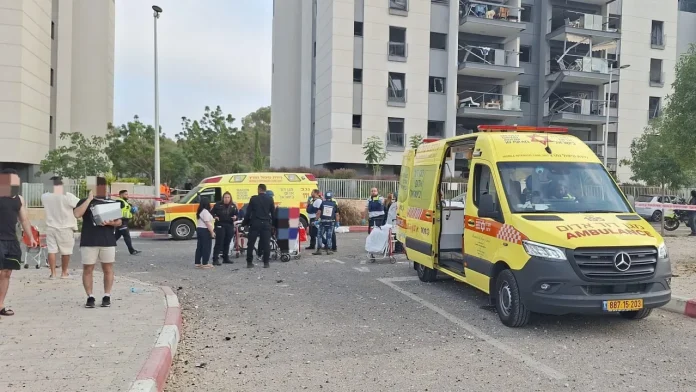An Iranian ballistic missile fell near a Microsoft office in the southern Israeli city of Beersheba on Thursday, according to Israeli media.
Israel under heavy rocket fire
Cars caught fire and multi-storey buildings were damaged in the area around the Microsoft office in the Israeli city of Beersheba after an Iranian missile struck.
Smoke was seen at the scene of the missile strike. No information about casualties has been reported. Earlier, the Israel Defence Forces (IDF) reported that Iran had launched missiles towards Israel.
According to Israel Hayom, several cars caught fire and residential buildings were damaged in the city of Beersheba as a result of one of the missiles. Specialists are working at the scene. Iran also struck the IDF headquarters and an Israeli intelligence facility in the city of Beersheba. One of the missiles exploded near the Soroka Hospital, causing serious damage.
Tel Aviv attacks on Tehran
Israel, in turn, struck a number of military and nuclear facilities in Iran, including Arak, Natanz, Isfahan and Bushehr. According to human rights organisations, at least 639 people, both military personnel and civilians, were killed in the strikes in Iran.
The Israeli army claims that more than 60 fighter jets attacked military targets in Tehran. Among them were reportedly missile production facilities and nuclear weapons development sites.
Targeting nuclear facilities
The head of the International Atomic Energy Agency, Rafael Grossi, confirmed in an interview with the Argentine newspaper La Nación that Iran did not possess a nuclear bomb and was not producing one at the time of the Israeli attacks.
Against the backdrop of the escalation, Israeli Prime Minister Benjamin Netanyahu called for continued attacks on Iran’s nuclear infrastructure. Israeli Defence Minister Yoav Galant said that Iran’s spiritual leader Ayatollah Khamenei “should not exist,” comparing him to Hitler.
Tehran, in turn, said it was ready to launch the “most intense” strike against Israel, but also expressed its willingness to negotiate — provided that Israeli attacks cease. The international community is calling for immediate de-escalation.
The EU, the UN and the G7 countries are initiating talks, and a meeting with the Iranian foreign minister is planned in Switzerland. According to White House sources, the US has not yet decided on military intervention but is keeping its fleet on full alert in the Eastern Mediterranean.
The Israeli uprising
On the ruins of Tel Aviv, Israel’s Minister of National Security and the head of the Mossad publicly clashed with each other.
Footage of the conflict between the two Israeli ministers, who were seen arguing and then fighting in front of a stunned crowd, went viral on the internet. According to the officials involved, the reason for the conflict was the start of a war with Iran.
Minister Itamar Ben-Gvir sharply demanded an explanation from the head of Mossad: “Who gave you the right to provoke Iran and expose the country to such a blow? You are to blame for Iran bombing Tel Aviv!” the politician said angrily.
The head of Mossad strangely parried these accusations, saying: “I did not imagine that Iran had such advanced missile technology.”
A video also appeared on the internet showing Tel Aviv residents rushing at Israeli soldiers in anger, accusing them of unleashing a military conflict with Iran.
Experts’ opinions
Experts note that almost a week of mutual strikes between Iran and Israel indicates a clear desire on both sides to limit the escalation of the conflict and not to bring the situation to a full-scale war. Neither Tehran nor Tel Aviv are showing any readiness to move into a phase of direct confrontation, which would involve the occupation of territories or the overthrow of governments.
Despite the bellicose statements from the Israeli leadership, Tel Aviv lacks a sufficiently powerful ground force capable of invading deep into Iranian territory, neutralising key nuclear facilities and changing the country’s political landscape. Moreover, the Israeli armed forces remain embroiled in heavy fighting in the Gaza Strip, where the front remains active and requires significant resources.
According to analysts, Iran is pursuing a similar tactic, showing neither the desire nor the real resources for a large-scale mobilisation and the launch of a ground invasion of Israeli territory. The Islamic Republic is following a long-established pattern: massive rocket launches, demonstrations of readiness to escalate the conflict if necessary, sharp diplomatic statements, and the use of information dumps and fake materials generated by neural networks. However, Tehran’s strategy appears to be aimed at a protracted confrontation with the aim of wearing down the enemy, rather than an active offensive.
Meanwhile, the United States has not ruled out the use of nuclear weapons against the underground nuclear centre in Fordow, one of the key facilities of Iran’s nuclear programme.
